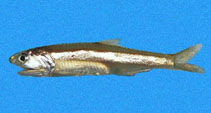| Family: |
Engraulidae (Anchovies), subfamily: Engraulinae |
| Max. size: |
12.5 cm TL (male/unsexed) |
| Environment: |
pelagic-neritic; marine; depth range 0 - 50 m |
| Distribution: |
Eastern Pacific: southern half of Gulf of California to Ecuador, excluding the Galapagos Islands. |
| Diagnosis: |
Dorsal spines (total): 0-0; Anal spines: 0-0; Anal soft rays: 14-17. Body fairly elongate. Snout long, about equal to eye diameter; maxilla moderate, tip rather bluntly pointed, reaching onto inter-operculum, but not to edge of gill cover; gill cover canals of panamensis-type. Anal fin very short, its origin below or behind last dorsal fin ray base. A silver stripe along flank, about 3/4 eye diameter. |
| Biology: |
A schooling species found in coastal waters. Caught over sand or gravel in the Gulf of Nicoya but not in inner parts of the Gulf. May spawn over a protracted period in Gulf of Nicoya. The eggs are oval. TL = 1.25 SL. |
| IUCN Red List Status: |
Least Concern (LC); Date assessed: 01 November 2019 Ref. (130435)
|
| Threat to humans: |
harmless |
Source and more info: www.fishbase.org. For personal, classroom, and other internal use only. Not for publication.
